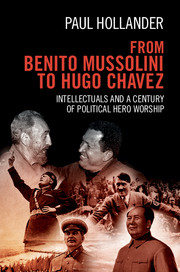Book contents
- Frontmatter
- Contents
- Preface
- 1 Introduction: Intellectuals and Politics
- 2 Mussolini, Fascism, and Intellectuals
- 3 Hitler, Nazism, and Intellectuals
- 4 Stalin, Rakosi, Soviet Communism, and Intellectuals
- 5 Western Intellectuals, Mao's China, and Cambodia under Pol Pot
- 6 Castro, Che Guevara, and Their Western Admirers
- 7 Other Dictators and Their Admirers in More Recent Times
- 8 Conclusions: The Personal and the Political
- Index
1 - Introduction: Intellectuals and Politics
Published online by Cambridge University Press: 19 January 2017
- Frontmatter
- Contents
- Preface
- 1 Introduction: Intellectuals and Politics
- 2 Mussolini, Fascism, and Intellectuals
- 3 Hitler, Nazism, and Intellectuals
- 4 Stalin, Rakosi, Soviet Communism, and Intellectuals
- 5 Western Intellectuals, Mao's China, and Cambodia under Pol Pot
- 6 Castro, Che Guevara, and Their Western Admirers
- 7 Other Dictators and Their Admirers in More Recent Times
- 8 Conclusions: The Personal and the Political
- Index
Summary
Politics in a dictatorship begins in the personality of the dictator.
Li ZhisuiDistinguished intellectuals, gifted poets, and influential journalists summoned their talents to convince all who would listen that modern tyrants were liberators and that their unconscionable crimes were noble, when seen in the proper perspective.
Mark LillaOne of the most perplexing attachments to be found among proponents of the high cause of liberty, humanity and a new world of peace, justice and love, is the admiration of absolute power and grandeur in the shape of the leader, hero, or conqueror.
Renee WinegartenThe personality of the leader matters far more in a dictatorship than in a democracy. Unencumbered by the constraints of institutions, legal norms, and public opinion, the dictator's personality exerts much greater influence on the exercise of power than that of elected leaders. In this study attention will be paid both to the actual personality of the dictators (insofar as evidence permits) and their images, or perceptions, and especially the positive impression they made on many Western intellectuals.
There is considerable evidence (presented below) indicating that many well-known twentieth-century intellectuals admired dictators of various ideological persuasion, as well as the political system they represented. Such admiration, often merging into hero worship, was an integral part of a substantial body of political misjudgments. Misjudgments of this kind were not limited to intellectuals: artists, scientists, journalists, clergymen, businessmen, and politicians too were capable of making them. In the following I will make occasional reference to the latter as well, especially when their misjudgments were similar to those of the intellectuals.
The admiration of dictators and dictatorships was seamlessly integrated: the attractions of individual dictators were inseparable from the appeals of the social-political system they symbolized, and the pages that follow reflect this connection. I did not come across a single case of a political system that was found admirable, but not its leader, or conversely, reverence for the dictator unaccompanied by positive sentiments about the system.
What Milovan Djilas, a leading Yugoslav communist functionary (and subsequently critic of the system), said of Stalin applies, in all probability, to other dictators as well, as discussed below, and accounts for their appeal: “He was the incarnation of an idea, transfigured … into pure idea, and thereby into something infallible and sinless.”
- Type
- Chapter
- Information
- From Benito Mussolini to Hugo ChavezIntellectuals and a Century of Political Hero Worship, pp. 1 - 46Publisher: Cambridge University PressPrint publication year: 2017



